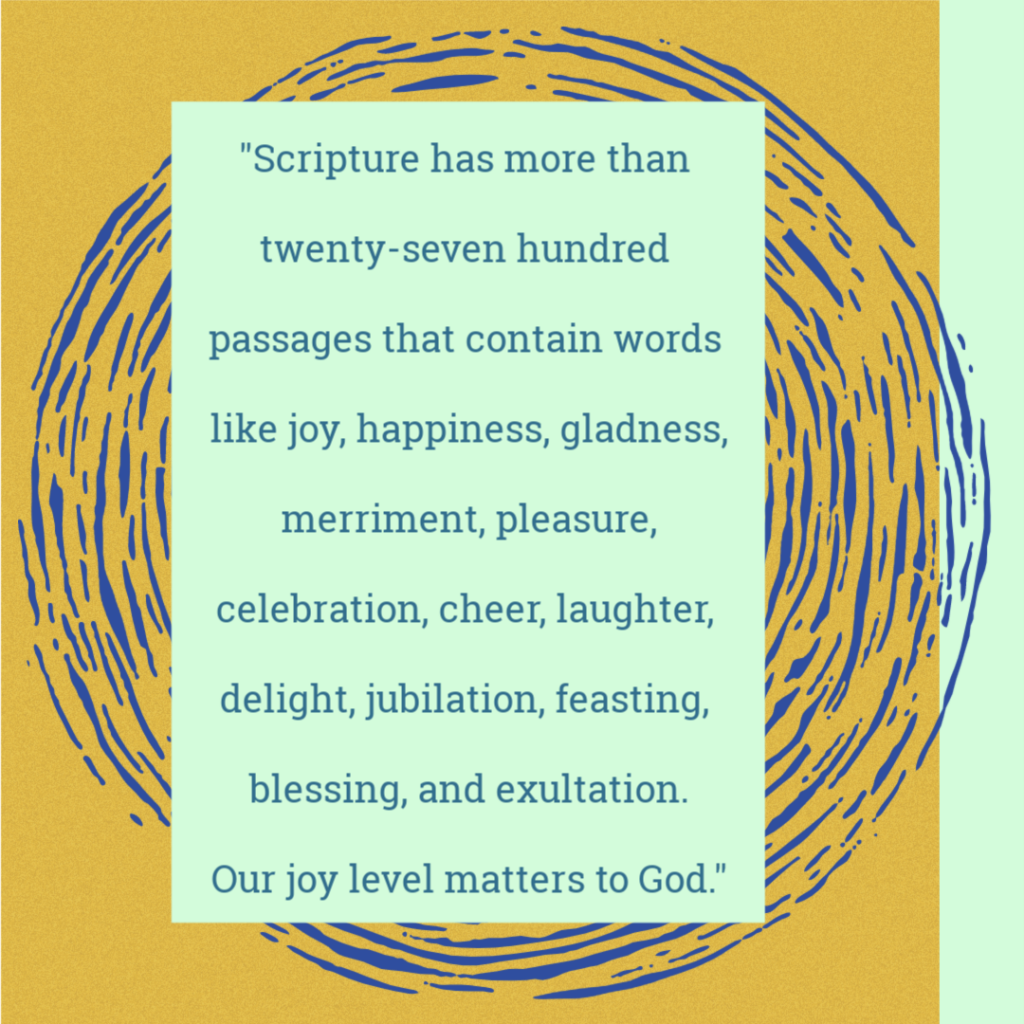Happiness is a universal desire. In fact, across the globe, people profess that happiness is their most cherished goal, and apparently it’s a worthwhile pursuit. In his book How Happiness Happens, Max Lucado writes, “Happiness. Everyone craves it. And everyone benefits from it. Happy people enjoy higher odds of a strong marriage, lower odds of divorce, and superior work performance. They are also healthier, resulting from a bolstered immune system. In one study researchers found a correlation between happiness and fatter pocketbooks. An analysis of twenty-five studies indicated that happy people are more effective leaders than Debbie Downers. Happiness, it turns out, helps everyone.”

I, of course, am not immune to the allure of happiness, as evidenced by my choosing JOY as my one-word focus for 2020. Part of this pursuit has involved reading a new book about joy each season, which is what led me to pick up this book. As I study joy this year, I hope to gain a better understanding of this quality—what it is, and how to cultivate more of it in my life.
Though a case can be made for the differences between happiness and joy, the two words are used interchangeably in Scripture. And regardless of semantics, this feeling can be elusive, with only one-third of Americans claiming to be happy. The reason for this is simple: most of us are seeking happiness in all the wrong places, taking what Lucado describes as the “front door to happiness” that depends entirely on the worldly goods we can acquire and the wealth, acclaim, and comfort we can achieve.
Our happiness matters to God. I don’t think it’s His primary goal for us (holiness and relationship take priority, of course), but He IS concerned with our happiness levels. However, God doesn’t care about the showy, ephemeral happiness that most of us spend our lives chasing. The happiness—joy—God desires for His children is genuine and long-lasting, and it is achieved through taking an entirely unconventional path. Thankfully, this path is given to us in Scripture, as Max Lucado has so clearly outlined in this book.

The New Testament contains more than fifty “one another” statements—practical principles that are the key to true happiness. In How Happiness Happens, Lucado elaborates on ten of them: 1) Encourage one another; 2) Bear with one another; 3) Regard one another as more important; 4) Greet one another; 5) Pray for one another; 6) Serve one another; 7) Accept one another; 8) Admonish one another; 9) Forgive one another; 10) Love one another.
As a lifelong Christian, I was familiar with these statements, but I had never thought of them in the context of happiness. These principles seemed like burdens rather than blessings—things I should do because they please God and are beneficial others, but not necessarily things I would want to do or that would benefit me in any way. How Happiness Happens helped me to understand that “doing good does good for the doer” and that leading a life of love, forgiveness, acceptance, and kindness is truly the key to lifelong joy.

Every chapter in this book is a winner. Lucado’s writing is humorous and his ideas are concise and memorable, backed by both Scripture and modern research and studies. Lucado uses illustrations from the life of Jesus to elaborate on each point, then gives present-day examples from his own life and the lives of people within his ministry.
Many of these principles are convicting, but a few specifically stood out to me: the chapter on accepting one another made me aware of my personal Savior complex and reminded me that “happiness happens, not by fixing people but by accepting people and entrusting them into the care of God.” The chapter on bearing with one another revealed my tendency to let pet peeves rob me of my joy, and instilled a desire in me to find peace by relinquishing these petty grievances. The chapters on service and forgiveness helped me understand that I cannot access complete joy when I am living for myself, and that putting others’ needs ahead of my own is best for them AND for me.

How Happiness Happens isn’t just a book about happiness. It’s a book about following Jesus’ example in pursuing a life of love, service, and sacrifice. It’s a book about hearing the words of God and putting them into practice. It’s about following a path that is pleasing to the Lord. It just so happens that this type of life is also one of ultimate joy and happiness. God’s BEST for us is not only glorifying to God and beneficial to others—it is a foolproof blueprint for own wellness, contentment, happiness, and joy.
Kendra, I adore your book reviews. You are my go-to blog for finding new books. So glad to hear you liked Max’s latest book. My husband and I read together every day, currently reading Every Good Endeavor by Tim Keller, but, our next book is already selected and is How Happiness Happens! Keep the reviews coming! And, from a mom of twins – you got this!
Wow, Susan, thanks so much for the compliment. That truly is so encouraging! I hope you enjoy How Happiness Happens. How was the Keller book? I have done a video study of his; I don’t think I’ve read any of his books, but he is a Christian voice I respect.